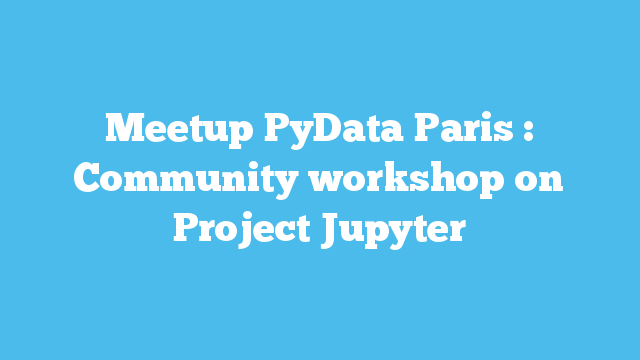
Date / Heure
Date(s) - 05/06/2019
17h00 - 19h00
Emplacement
Interdisciplinary Research Center (CRI) 8, 8bis Rue Charles V · Paris
Catégories
Mark your calendar for the next session of the PyData Paris Meetup on June 5th 2019! This Meetup is hosted by the Centre de Recherche Interdisciplinaire (CRI), 8 rue Charles V, 75004 Paris.
This is a special edition of our event series in that it is organized in the occasion of a community workshop on Project Jupyter and a large number of developers of the Jupyter ecosystem will be in town. Hence we will have one main talk by our invited speaker, Emmanuelle Gouillart, followed with a series of “lightning talks” by participants to the Jupyter workshop.
Schedule
————-
6:00pm – 6:15pm: Community announcements
6:15pm – 7:00pm: Emmanuelle Gouillart
Dash: a web framework for writing highly-tuned apps for data science in
pure Python
7:00pm – 7:45pm: Jupyter Community Lightning talks. (Series of short presentations in rapid succession).
7:45pm – 8:30pm: Standing buffet
Abstract
————
Dash (https://dash.plot.ly/) is an open-source Python web application
framework developed by Plotly. Written on top of Flask, Plotly.js, and
React.js, Dash is meant for building data visualization apps with highly
custom user interfaces in pure Python. I will give a demo of how to write
Dash apps with pure Python, starting from very simple apps to more
advanced ones, including reactive apps based on advanced data
visualization. I will also discuss the performance and deployment of Dash
apps.
Dash benefits from several component libraries, from the core components
(eg sliders, radio buttons, file dialogs) to more custom and
application-specific components, such as components for engineering or
life sciences applications, or data tables. I will take the example of
the dash-canvas library, which provides an interactive component for
annotating images (eg with freehand brush, lines, bounding boxes…). The
library also provides utility functions for using user-provided
annotations for several image processing tasks such as segmentation,
transformation, measures, etc. The latter functions are based on
libraries such scikit-image and openCV. A gallery of examples showcases
some typical uses of Dash for image processing on
https://dash-canvas.plotly.host/. I will eventually mention how to write
your own component libraries for custom Dash components.
Bio
—-
Emmanuelle is a materials science researcher at Saint-Gobain, and a
part-time developer at Plotly, where she works on image processing and
documentation. She has been a core contributor of scikit-image for
several years, and her interest in image processing was triggered by her
use of 3-D imaging of materials at high temperature. She recently created
the dash-canvas library for integrating image annotating and processing
into the Dash Python web framework. In software development, besides
image processing she is interested in documentation and teaching
scientific Python. She has been a co-organizer of the Euroscipy
conference for several years.
https://www.meetup.com/fr-FR/PyData-Paris/events/261452824/









